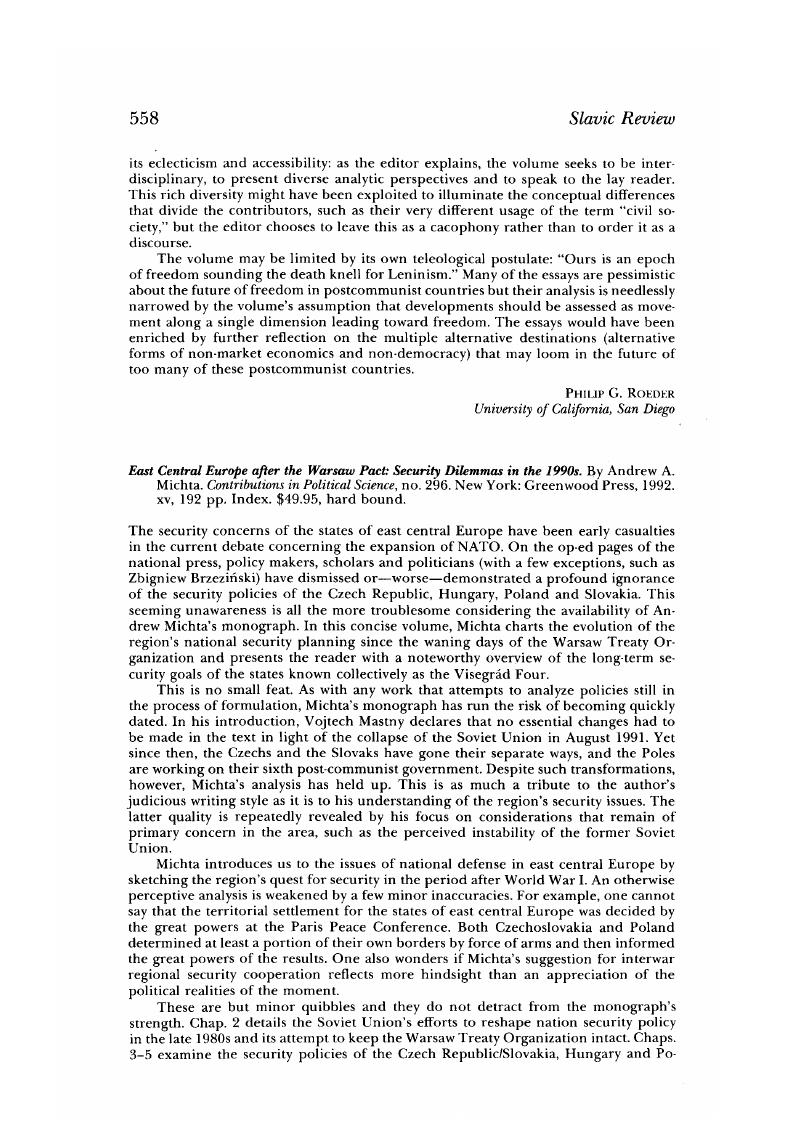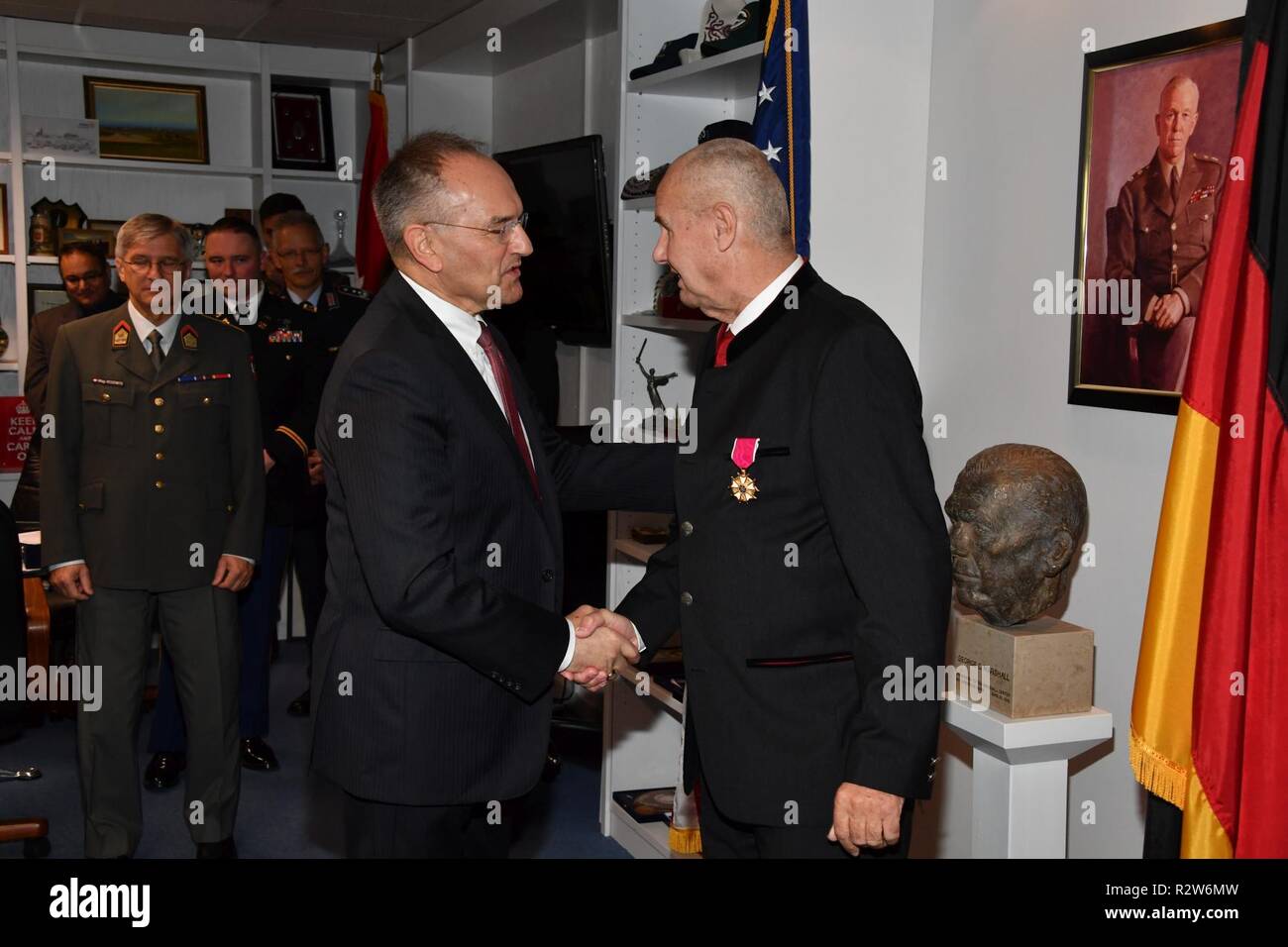Andrew A Michta - Dr. Andrew A. Michta is the George K. Dean of the School of International and Security Studies at the Marshall Center for Security Studies. Fluent in Polish and Russian, Dr. Michta has focused his professional life on international security, NATO and the countries of Central and Baltic Europe.
We can say that after the end of the Cold War, NATO focused its threats on non-state donors instead of the threats of states. Do you think this has changed since the annexation of Crimea in 2014?
Andrew A Michta

I'm not sure NATO has changed its mind since the Cold War; It has changed a lot since 9/11, at least from an American perspective. At the end of the Cold War, NATO wanted a mission. The security environment in Europe has improved significantly with the collapse of the Soviet Union and the reunification of Germany. You had a "peace interest", but you also had an expansionist approach, which was the formula for post-communist stability.
East Central Europe After The Warsaw Pact: Security Dilemmas In The 1990s. By Andrew A. Michta. Contributions In Political Science, No. 296. New York: Greenwood Press, 1992. Xv, 192 Pp. Index. $49.95,
Today, it seems like a foregone conclusion that NATO will expand, but I remember the first discussions and there were serious concerns about the gray situation in Europe. Unexpectedly, the former Eastern European countries began to share borders with NATO, so the security and safety of these countries became a major national interest for Germany and the larger transatlantic alliance.
For NATO, to me, after the collapse of the Soviet Union before 9/11, it was largely a broader mission -- it was more of a political mission than a defensive mission. The main action was to join your region in NATO. Because two things happened, although we never knew that the Soviet Union had annexed the Baltics to the USSR, from Russia and Europe, the Baltics were part of the Soviet Empire.
The American approach was first made by Madeleine Albright, who supported it, but many others who participated in the first debate about NATO expansion went to the group. That means we would go with half of the countries, not a single country, as was the case during the Cold War. The criteria have also changed, as we have presented four points: you must be democratic, market economy, contribution to unity, and you must not have a border problem. There was a relative ease with which Polish members were first admitted, but the Baltics were strong. From what I saw at the time, the British wanted the various countries to continue reforming and competing for membership. The second approach is what we call Slo-Slo, with Slovenia and Slovakia moving south because the political costs would be lower. But the third was the Baltic, and the argument of the people who supported the Baltic expansion, and I was one of them, is that we cannot let the Russians have the Baltic red line, because if we let that happen in the Baltic region. . In fact it restores the principle of utility units in Europe.
2014 was a call. This upset the European agenda, as it inevitably undermined European security. Especially in Germany, but also in the whole region, there has always been the idea that borders cannot be changed by force. 2014 turned NATO, at least in definition, into a traditional defense alliance. Which, unfortunately, for Europeans means only the here and now, and that is the missing piece. When President Trump was elected, he said about the fight against terrorism and traditional defense, that there should be a way to match the US plans with the demands and wishes of the Europeans.
Jacek Bartosiak Rozmawia Z Andrew Michtą O Geopolityce, Przyszłości Europy I Polski Oraz O Napięciu Usa Chiny (wideo)
Sometimes I tell my students, nations live in neighborhoods, depending on your size, that's how your neighborhood is formed. So, since your neighbor is Baltic-Scandinavian-Central Europe, all you see is Russia. But we (US) are a global power, our neighbors are global. Europeans don't even think in these terms, it's all one sided and very close. Even a powerful country like Germany, economically developed and powerful, has a regional security perspective. This is only broken because Africa came to Europe and the Middle East came to Europe. But when the sanctions were imposed in 2014, Putin largely abandoned the diplomatic game he was playing with Russia, and clarified those words. The US response has been to show we are ahead, with two NATO summits in Wales and Warsaw, and now a third in Brussels. We have set up a tour guide and it is very important that you have an international battalion in your country for training.
That's not a good question right now, because the real question is the size and scope of your business. General Hodges, when he was the commander of the American forces in Europe, said, I have 30,000 troops to have 300,000. And my answer has always been - Ben, the Russians can count. Let's remember that the Russian army is not a Soviet army, it is not a Warsaw Pact threat. Obviously, a permanent policy will send a stronger message than a cyclical one. That being said, politics is the art of possibility. We at Alliance have come up with a solution that everyone can live with, right now. The most important thing about this is what happens when the cable breaks? Because it was now assumed that the Russians would not dare to move to the Baltics because it would bring them into conflict with the United States and the NATO alliance.
It also goes back to the process of establishing NATO with Russia, what kind of security do you think could come around? can i

I think that action was taken very seriously considering that Russia attacked a sovereign state. Even people who oppose permanent bases in Poland or more in the Baltics agree. The question then becomes, what do you do about this problem? The biggest problem facing NATO, in my opinion, is the different perception of security in the region of the different countries that are members of this organization. Whether you were in Cold War France, Germany or elsewhere, the threat posed by the Soviet regime was such that there was such a consensus that when the myth was born, we would all be together. Now, if you go to the region, when you go to the Baltics, when I talk to diplomats or soldiers, they tell me Russia, Russia, Russia. Same as in Poland.
E Camca Week Panel: \
I'm going to Germany, it's still Russia, but it's not a direct threat to Germany, it's a rule based on European law. I'm going to France, it's the south. So this means that when there is a crisis, maintaining that harmony is a serious problem.
My friend was telling me if the Russians moved the border to Estonia to 500 meters or to Latvia? I hope your government will use Article 5 to attack you and ask for help. I'm sure people on the sidelines from the police to Sweden, even though the Swedes are not in NATO, will support you. How will you handle it if you start traveling west? Will the solution be automatic in Germany? What about the French? Maintaining a cooperative relationship is very important. That is why I am always skeptical about the construction of the underground system of the district. They are useful in terms of economic cooperation, but they also create a sense of fragmented space. Europe is divided as it is: over immigration, over identity, over politics. If you are in the Baltics, you are basically on the border, this is a great idea. The Union also has a serious problem in infrastructure and infrastructure.
There is enough preparation for war because the United States and some allied countries in Europe have the resources they can use. The question is whether we have the infrastructure to deliver these assets. America is now looking at us in Europe, but the situation remains the same as it was during the Cold War. In the event of a military conflict, it would require a greater deployment of U.S. assets to Europe, as well as the relocation of coalition assets to the African continent where necessary.
During the years of peace, the infrastructure was either destroyed or not adequately renovated. I'm talking about the port's ability to unload US military equipment, I'm talking about bridges. Once the tanks are heavy, the platform, tanks and trailers are heavy. There must be a major reform of roads, bridges, fuel capacity, railways... If you don't have the infrastructure to do this capacity, your retention will be affected.
Ukraine Crisis Of 2022: The Final Battle Of The Cold War
I would rather be in a position to prevent an attack on the NATO alliance than your own country
Andrew a walker, a man on the moon andrew chaikin, napoleon a life andrew roberts, day trading for a living andrew aziz, andrew loomis fun with a pencil, a squiggly story by andrew larsen, a journey in ladakh andrew harvey, andrew michta, a andrew das, andrew a smith, andrew a, andrew wyeth a secret life
0 Comments